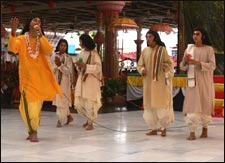Kabir Das - A Telugu Play By Rasaranjani

Kabir Das - A Telugu Play By Rasaranjani is an event that took place between 16-May-2007 and 17-May-2007 in Hyderabad.
-
Venue
-
Date/Time
-
Type
-
Price
-
Tickets At
-
Add New Field:
You've certainly mugged up several of his dohas - almost as certainly, without internalizing a single one! This month, Rasaranjani puts one of India's most popular saints on stage.
Rasaranjani is organising a Telugu play called Kabir Das, on 16th and 17th May, at Sri Thyagaraya Gana Sabha. The story is written by Dr Nandamuri Lakshmi Parvathi, adapted by D Vijay Bhaskar, and directed by Duggirala Someshwara Rao. The role of Kabir Das is being played by Mikkili Francis, those of Kabir's father by Someshwara Rao, Kabir's mother by K Vijayalakshmi and Kabir's wife by D Rajeshwari. B Narayana, K Nataraj, Srilakshmi, Ch V V Satyanarayana, M V Kutumba Sarma, V Raghuvir, Goparaju Ramana, Y Mallikarjunam and Mutnuru Kameshwara Rao playing the miscellaneous roles.
Kabir Das was a great saint of the 15th century. Nothing is known about is his parents and his birth, but it is believed at he was born in 1440, near Varanasi. He grew up in a Muslim weaver family, but some say he was really the son of a Brahmin widow, and was adopted by a Muslim childless couple.
In his early days, he studied under Guru Ramananda, a great Hindu scholar. The play deals with the later part of Kabir Das' life, when he teaches both faiths. He had written a number of poems that were later translated into English by Rabindranath Tagore, thus letting the world know of this great saint. His poems were even appreciated by British and American authors.
One popular legend of his death, which is even taught in schools in India (although more in a moral context than a historical one), says that after his death his Muslim and Hindu devotees fought over his proper burial rites. The problem arose as Muslim customs buried their dead, whereas Hindus cremated them. Hindus claimed that Kabir was a Hindu, and Muslims claiming that he was a Muslim.
However, when they finally opened Kabir's coffin, they found the body missing, and in its place found a small book. The Hindus and Muslims then wrote all his sayings that they could remember in the book, and some even say that a bunch of his favorite flowers were placed. The legend goes on to state that the fighting was resolved, and both groups looked upon the miracle as an act of divine intervention.
The entry to the play is by tickets of Rs. 10 per head.
5 USERS
Artist(s') Talent
Entertainment
Production Quality
Ambience/Crowd
NA
NA
NA
NA
Good for kids/family - NA
Good for dates - NA
Good for networking - NA
Time well-spent - NA
Be the first to comment on Kabir Das - A Telugu Play By Rasaranjani! Just use the simple form below.
LEAVE A COMMENT
fullhyd.com has 700,000+ monthly visits. Tell Hyderabad what you feel about Kabir Das - A Telugu Play By Rasaranjani!
MORE EVENTS IN THIS PERIOD
ALL EVENT CATEGORIES
SEARCH EVENTS
Dissatisfied with the results? Report a problem or error, or add a listing.
ADVERTISEMENT
SHOUTBOX!
{{ todo.summary }}... expand »
{{ todo.text }}
« collapse
First | Prev |
1 2 3
{{current_page-1}} {{current_page}} {{current_page+1}}
{{last_page-2}} {{last_page-1}} {{last_page}}
| Next | Last
{{todos[0].name}}
{{todos[0].text}}
ADVERTISEMENT
This page was tagged for
DUGGIRALA SOMESHWAR RAO FAMILY
teluguplay.com 2007
Sri Thyagaraja Gana Sabha Sri Thyagaraja Gana Sabha events
May 2007 events
hyderabad theatre / comedy / dance